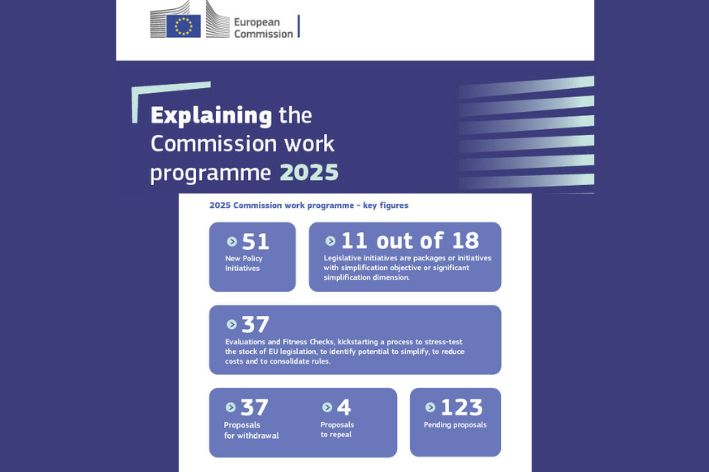The European Commission has adopted its 2025 work programme, outlining its ambition to boost competitiveness, enhance security, and bolster economic resilience in the EU. Maroš Šefcovic, EU Commissioner for the Economy, presented the programme to the plenary session of the European Parliament.
The work programme focuses on the flagship initiatives the Commission will take in the first year of its mandate, responding to the issues that matter most to Europeans. It reflects the need for more opportunities, innovation, and growth for our citizens and businesses, ultimately fostering a more secure and prosperous EU.
An important development for civil society organisations is that an EU Strategy to support, protect and empower the civil society will be proposed in the second half of 2025. The planned document is non-legislative, i.e. it will not be binding for Member States to transpose into national law, but it could be a guideline at European level. European House Budapest has long been working on the adoption of a strategy recognising the work of civil society organisations at macro-regional level. Most recently, at the First Macro-Regional Citizen Agora in Budapest at the end of 2023 a proposal for such a strategy was presented and adopted.
A Communication on Implementation and Simplification accompanies the work programme. It sets out how the Commission plans, over the next five years, to make implementation of EU rules easier in practice, and to reduce administrative burdens and simplify EU rules.
Here are the key deliverables of the 2025 European Commission work programme:
- Sustainable Prosperity and Competitiveness: The newly launched Competitiveness Compass will guide sustainable growth efforts, with the EU Start-up and Scale-up Strategy empowering entrepreneurs through better access to capital.
- Defence and Security: Amid tensions in the geopolitical landscape, the EU is intensifying efforts to safeguard security and ensure peace, unveiling plans to build a robust future for European Defence. By investing collectively and strategically with NATO’s cooperation, the EU aims to reinforce its defence industry and reduce dependencies.
- Supporting people, strengthening our societies and our social model: Aiming to cement Europe’s unique and highly treasured social model and to strengthen social fairness, the Commission will spearhead efforts to modernise social policies through the New Action Plan on the European Pillar of Social Rights.
- Sustaining our quality of life: The Commission will present a Vision for Agriculture and Food to ensure a stable framework for farmers and outline a roadmap for key proposals. A simplification package of the Common Agriculture Policy will address sources of complexity and administrative burden for farmers and national administrations.
- Protecting democracy and upholding values: Initiatives like the Democracy Shield will tackle threats like rising extremism and disinformation. The Commission also plans to enhance strategies to combat discrimination based on gender, disability, sexual orientation, or race, including a renewed LGBTIQ Equality strategy and a new Anti-racism strategy.
- A global Europe, leveraging our power and partnerships: Whilst working for Ukraine’s freedom remains a priority, the EU is committed to a just, comprehensive and lasting peace based on the two-state solution in the Middle East. A Mediterranean Pact and Black Sea strategy will focus on regional cooperation, economic investment, and security.
- Delivering together and preparing our Union for the future: The European Commission plans to present a new Multiannual Financial Framework focused on simplifying access to EU funding and enhancing financial impact to support national, private, and institutional financing. Additionally, a focus on pre-enlargement policy reviews will further assess the consequences and impacts of enlargement on all EU policies.
